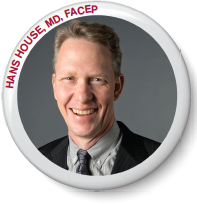
As President, I would work to improve the feedback loop from our chapter leadership and the Council by engaging our social media platforms and enhancing our survey feedback tools. This will help to align ACEP’s initiatives with our members’ priorities. As your President and Chief Advocacy Officer, I will ensure that those priorities become results.
Explore This Issue
ACEP Now: Vol 36 – No 08 – August 2017Hans House, MD, FACEP (Iowa)
 Current Professional Positions: Professor, emergency medicine, University of Iowa; vice chair for education, Department of Emergency Medicine, University of Iowa, Iowa City
Current Professional Positions: Professor, emergency medicine, University of Iowa; vice chair for education, Department of Emergency Medicine, University of Iowa, Iowa City
Internships and Residency: Combined internal medicine–emergency medicine residency, Olive View–UCLA Medical Center, Sylmar, California
Medical Degree: MD, University of Southern California (1997)
Candidate Response
The ACEP President is the spokesperson of the college. Over the last five years, ACEP’s media relations team has done an incredible job of increasing the number of on-camera media interviews. The Washington, D.C., office has greatly increased the opportunities for in-person small group meetings with politicians. As the face and voice of the College, the President must be an articulate and effective public speaker. I am an experienced, dynamic, and charismatic speaker who can convey the energy and enthusiasm of our diverse specialty.
As President, I will focus on reducing burnout in our members by addressing system changes in our workplace. As work environments, emergency departments are dangerously prone to normalizing conditions that radically deviate from what is acceptable. The constant frustrations generated by enduring the sense of powerlessness and dysfunction in today’s health care system are cutting short the careers of brilliant and caring physicians. Panagioti et al found that interventions that focus on system changes are almost twice as effective at reducing burnout than interventions that only address the individual physician.1 In other words, no amount of yoga and meditation is going to help until the underlying system frustrations are addressed.
“As work environments, emergency departments are dangerously prone to normalizing conditions that radically deviate from what is acceptable. The constant frustrations generated by enduring the sense of powerlessness and dysfunction in today’s health care system are cutting short the careers of brilliant and caring physicians. ” —Hans House, MD, FACEP
As President, I would direct ACEP to aggressively target system changes, even on a local level. Important drivers of burnout that I would address include the boarding of inpatients (especially mental health patients), merit badge requirements for hospital credentialing, improving the maintenance of certification process, and encouraging stability in hospital contracts. Furthermore, our members can maximize control over their workplace by owning it themselves, so I embrace the trend toward opening freestanding emergency centers. These centers revive career satisfaction, provide ideal access to care for patients, and bring sorely needed disruptive change to an entrenched and dysfunctional system.
Reference
- Panagioti M, Panagopoulou E, Bower P, et al. Controlled interventions to reduce burnout in physicians: a systematic review and meta-analysis. JAMA Intern Med. 2017;177(2):195-205.
Pages: 1 2 3 4 | Single Page




No Responses to “2017 ACEP Elections Preview: Meet the President-Elect Candidates”